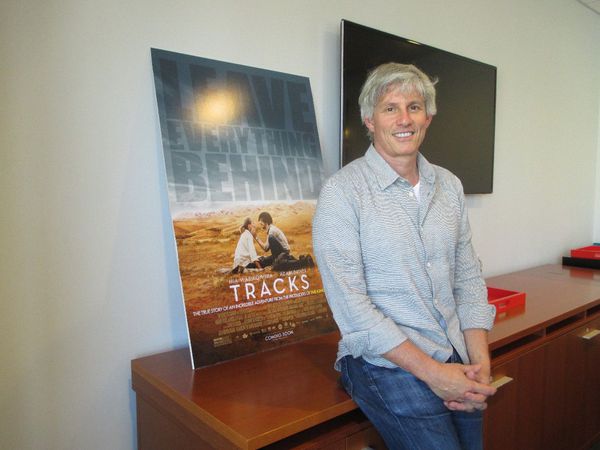 |
| Tracks director John Curran on Mia Wasikowska as Robyn Davidson: "She was pretty immediate about her enthusiasm." Photo: Anne-Katrin Titze |
John Curran's astute and tender Tracks stars Mia Wasikowska as Robyn Davidson with Adam Driver as photographer Rick Smolan and Rainer Bock as camel rancher Kurt Posel. Bock miraculously combines his roles in Michael Haneke's The White Ribbon, Quentin Tarantino's Inglourious Basterds and Christian Petzold's Dreileben: Beats Being Dead and Barbara, into an Outback brute able to compete in attention with the growling beasts.
In New York, Curran and I discussed Wasikowska coming to him after Jim Jarmusch's Only Lovers Left Alive "in a state she needed to work through", an unrealised F Scott Fitzgerald's The Beautiful And The Damned project with Keira Knightley, The Wizard Of Oz, Stardust Memories, basic survival and basic relationships.
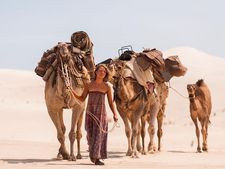 |
| Mia Wasikowska as Robyn Davidson in the company of three adult camels and a calf named Goliath. |
Tracks leads us deeply into a looking glass of humanity's poisonous everyday flaws through screenwriter Marion Nelson's passionate attentiveness based on Davidson's book, which chronicles her 1,700 mile journey across Australia in 1977 when she walked from the town of Alice Springs to the shores of the Indian Ocean in the company of three adult camels, a calf named Goliath and her beautiful black dog Diggity..
Anne-Katrin Titze: Tracks has a number of scenes with terrific intensity. One of them happens early on when she arrives in town with her dog and her suitcase and the men on a truck point their guns at her, laughing as if this is a joke. It says it all about what she is up against. Where did the scene originate?
John Curran: You know, Roo shooters, Kangaroo shooters are very common up there. In the book there's a long chapter about her arrival and the kind of male characters she came into contact with. Back then it was very male chauvinist. It was pretty rough. That's part of what's surprising about the book. It shows this urban, educated, seemingly gentle, frail woman arriving in this very male dominated place. I was looking for something that said it all in one instant. I've seen that image before, those guys going by with the trucks with the kangaroos hanging off them. I thought I could do a lot with something very simple.
AKT: It shows perfectly the idea of prey that she refuses to be.
JC: And I like her reaction. She's not afraid of it.
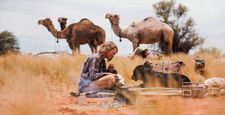 |
| Mia Wasikowska as Robyn Davidson with Diggity - Stardust Memories: "what were some of your mother's favorite songs?" |
AKT: Also, already in that scene you made the audience feel the vulnerability of the dog left there to sit, as well as the strength. The couples she encounters before her trip have very strict power dynamics. The men are in control. Rainer Bock plays one of those men, brilliantly so. Did you cast him after seeing him in films by Christian Petzold and Michael Haneke?
JC: He is great. I love him. I saw The White Ribbon, it is one of my favorite films. Haneke I think is genius. I was looking for a German character. I didn't want someone do a fake German character. And I got a hold of Rainer and he said "yeah, I've never been to Australia, I'd love to come down." He was really great.
AKT: Early on in the hotel you show another couple with a similar dynamic. The couple she meets in the desert later on is different. Is there a progression also in whom she encounters?
JC: Progressively, what I was trying to do, as she got deeper into the desert, it goes back in time. She moves away from the present and things become more traditional and ultimately almost primitive. I wanted there to be different dynamics, different kinds of men out there in the desert that escaped or made the decision to be out there.
AKT: I liked how you parallel the talkativeness of the men. The so-called civilised ones talk just as much as the Aborigine Mr. Eddie (Roly Mintuma), only we don't understand what he is saying. It's the same - he might as well be talking about the Deli being closed [as Rick does].
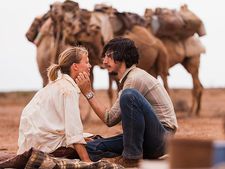 |
| Mia Wasikowska as Robyn Davidson and Adam Driver as Rick Smolan: "Rick's very smart with a lot of energy but out of place in the desert with Robyn." |
JC (laughs): Exactly, yeah. For some reason it's not that annoying to her.
AKT: It's understandable. When you're in a country where you don't speak the language and people are loud at the next table, you care that much less than if you understand their nonsense. I am looking forward to speaking to Rick. Your portrayal of him could be considered quite harsh.
Driver plays photographer Smolan, one specimen among the smarmy and pretentious guys during an obnoxious visit. "Rick knows a lot of magazine editors," and if he is allowed to drop in on her journey from time to time, National Geographic agrees to give her the money needed for the trip.
JC: I think he knew what I was doing. Rick is lovely, you'll meet him. We had to look at him from Robyn's point of view. From Robyn's point of view, Rick was annoying, not because of his character, but because he was there and he was loud and he didn't get the desert. In the book, she goes from really resenting him to opening up to him to being ultimately a close friend of his. That's the arc of the film. It's not about falling in love, it's meeting a friend with those two. Rick's very smart with a lot of energy but out of place in the desert with Robyn. I loaded on more of the goofy qualities with Adam [Driver] and make him really annoying initially. And also funny.
AKT: Of course, that's one of the three saving graces - "hope, jokes and dogs". He provides the jokes.
JC: Exactly. And ultimately the hope, too.
AKT: One of my favorite scenes is when her dog Diggity, in the desert, gets them "home". In my review I called it the most "wonderful definition of home since Dorothy declared that there's no place like it in 1939." It's the heart of the movie. Where did this scene come from?
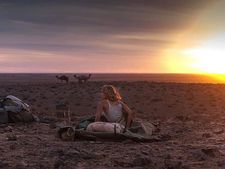 |
| Mia Wasikowska as Robyn Davidson: "Progressively, what I was trying to do, as she got deeper into the desert, it goes back in time." |
JC: Oh yes, I love that scene. That happened. I got that from the book. She lost her compass and couldn't find her way back to the campsite. And she yelled at Diggity "Go home!" and the dog thought it had done something wrong with the tail between its legs. Just like the scene.
AKT: The dog is great - was it difficult?
JC: Yes and no. It's harder with a black dog in the desert to get them to do a lot because they get hot very quickly. They just give up. So we had two dogs that played one. One was more playful than the other who was more dependable.
AKT: Did the camels also have their doubles?
JC: They all had stand-ins. They were great. I mean, that's what they do, right? The trainer runs a camel trek company. To them the whole shoot was easy. They had to stand around and look like camels.
AKT: The scene with the snake was daring and it paid off. The timing had to be exactly right. It gave me a sense of loss of innocence of someone completely blameless.
JC: Oh, good. There's almost a dream-like quality to it. It's an expression of what she is feeling like. We didn't plan on it, but the snake in one take came up over her neck. That's so much more intrusive. The strangulation theme - given that her mother hung herself. That's the symbolism for me.
AKT: Wow, I didn't even think of that. How much did you work with Robyn Davidson?
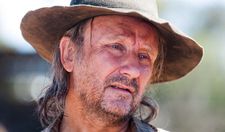 |
| Rainer Bock as camel rancher Kurt Posel in Tracks: "I got a hold of Rainer and he said 'yeah, I've never been to Australia, I'd love to come down.' He was really great." |
JC: Not too much. I think that she wanted to be removed from it. More out of respect for us as creative people. She read the script and gave her stamp of approval. She came out to the shoot for a couple of days. She knew that Mia [Wasikowska] would be uncomfortable. You know, it's weird to have someone that you're playing there. In the editing, she was available if I had questions, like "what were some of your mother's favourite songs?"
AKT: Stardust Memories?
JC: Yes, that was from her.
AKT: Did Mia Wasikowska say yes to you right away or was she hesitant?
JC: She was pretty immediate about her enthusiasm. Then it was difficult because she was so busy that year. She did Jim Jarmusch's film, she did The Double and she did Stoker. It was a difficult year, by the time she came to us she was really wrung out. It was tough for her and good for us because she was already in a state she needed to work through.
AKT: In Only Lovers Left Alive, she couldn't be more different as a vampire. Tell me about the structuring of the flashbacks. You are leading up to the central heartbreak by giving hints but you allow us to not want it to be true. I was resisting the truth you ultimately reveal for as long as I could.
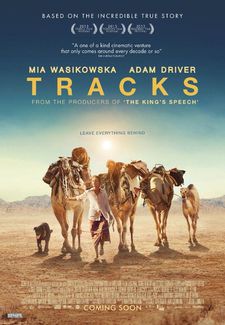 |
| Tracks UK poster |
JC: Those are very difficult to get right. Every single one of the flashbacks gives you a different bit of information. It's a tease in a way - you certainly don't want to telegraph any tragedy. It was a character not processing the death of her mother, or rather processing the death of her mother through the death of her dog. The two tragedies are really closely related to each other. Finding the language so that it felt organic with the film - we experimented a while with that.
AKT: Your film strongly criticises some of what is considered normal in our civilised world. Canisters of pesticide, of strychnine in the middle of the desert, for example.
JC: People going out there in the desert, trying to farm it, killing off species. That's why the strychnine is out there, because of the wild dogs that run after the sheep or cattle.
AKT: Why did you first want to make this movie?
JC: I loved the story of it. There's the text - a woman decides to walk across the desert. Then there's the sub-text and the text below that. When you're making a film you are dealing with layers. She is going back in time to a primitive state of being disconnected, being alone, and dealing with fire. Basic survival. Basic relationships being all that you have, whether it's a dog or a human being. Either you are alone, but what is alone? Alone is forced upon her ultimately.
AKT: You are more alone when you have lost something.
JC: Yes, that's truly the definition of alone. Rather than going out and just making the decision to turn off your phone. They are two different kinds of alone.
AKT: You show Aborigine traditions without the fake awe that often accompanies these depictions.
JC: I think there's more dignity in being authentic to who they are than making them into some noble element of your film. That to me feels patronizing and false. There isn't a political agenda.
AKT: I read that you had planned to do F Scott Fitzgerald's The Beautiful And The Damned with Keira Knightley. What happened to it?
JC: Now I'm doing a mini series for HBO on Lewis and Clark. The Fitzgerald film fell apart during the big crash in 2008 that wiped out financing. That crash in 2008 killed that project.
AKT: How terribly appropriate, when you know the novel.
JC: I never even thought about it, but you're right.
AKT: I spoke with Volker Schlöndorff a few days ago and he has an un-financed Max Frisch inspired Montauk project he wanted to do with Ralph Fiennes. Let's put these out there for the money gods to possibly read about the projects.
Having a baby camel drink out of your cup, a water canister dropped off in the desert, human kindness over a game of scrabble, a friendly stranger washing your hair and dusty ears, Stardust Memories under the stars - Tracks convoys us to inspiring compassion.
Rick Smolan's book, Inside Tracks: Robyn Davidson's Solo Journey Across the Outback (Against All Odds Productions) will be published on October 21.
Tracks opens in New York and LA on September 19.





















